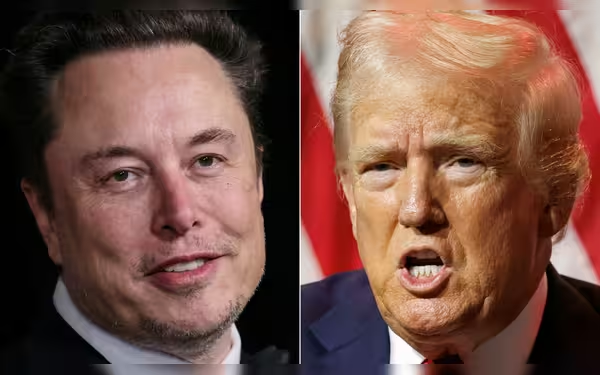Saturday, November 16, 2024 05:39 PM
Trump Proposes Elon Musk for Government Efficiency Panel
- Trump plans to appoint Musk for government efficiency.
- Musk's role could save trillions in federal spending.
- Concerns arise over potential conflicts of interest.
 Image Credits: arabnewspk
Image Credits: arabnewspkTrump proposes Elon Musk to lead a government efficiency panel, aiming to save trillions and reform federal spending.
In a bold announcement made on Thursday, former President Donald Trump revealed his intention to appoint billionaire entrepreneur Elon Musk to lead a new government efficiency panel if he is elected president again. This proposal comes as part of Trump’s broader plan to audit government spending and implement significant reforms aimed at reducing waste and improving efficiency within the federal government.
Trump stated that the idea for this commission originated from Musk himself. He proposed the creation of a "government efficiency commission" that would be responsible for conducting a thorough financial and performance audit of the entire federal government. With Musk at the helm, Trump believes this initiative could potentially save the nation "trillions and trillions of dollars." During his speech at the Economic Club of New York, Trump emphasized the urgency of the matter, claiming that the commission would develop an action plan to eliminate fraud and improper payments within a mere six months.
Elon Musk, the CEO of Tesla and SpaceX, has been a controversial figure in the business world, often clashing with regulators. His past interactions with the Securities and Exchange Commission (SEC) highlight this tension, particularly when the agency mandated that Musk’s tweets be vetted after he made statements that were deemed "false and misleading." Furthermore, Musk's ventures, including his ambitious plans for autonomous driving technology, are also under the scrutiny of government agencies.
Jordan Libowitz, a spokesperson for Citizens for Responsibility and Ethics, a non-profit organization, expressed concerns regarding the potential conflict of interest that could arise from Musk's appointment. He noted that while Trump’s proposal is still somewhat vague, it is crucial for Musk to recuse himself from any policy decisions that could directly impact his businesses, such as government contracts for SpaceX or regulations concerning autonomous vehicles. Libowitz also suggested that Musk would likely need to disclose his financial holdings, which would be subject to public scrutiny under U.S. regulations.
This proposal raises important questions about the intersection of business and government. If Musk were to take on such a role, it would not only reflect his growing influence in political circles but also highlight the ongoing debate about the role of private sector leaders in public governance. As the political landscape continues to evolve, the implications of such appointments could have lasting effects on policy-making and the relationship between government and business.
Trump’s proposal to appoint Musk as the head of a government efficiency panel is a significant move that could reshape how government spending is managed. While the potential for savings is enticing, it is essential to consider the ethical implications and ensure that any conflicts of interest are adequately addressed. As citizens, it is our responsibility to remain informed and engaged in these discussions, as they ultimately affect the governance of our nation.













